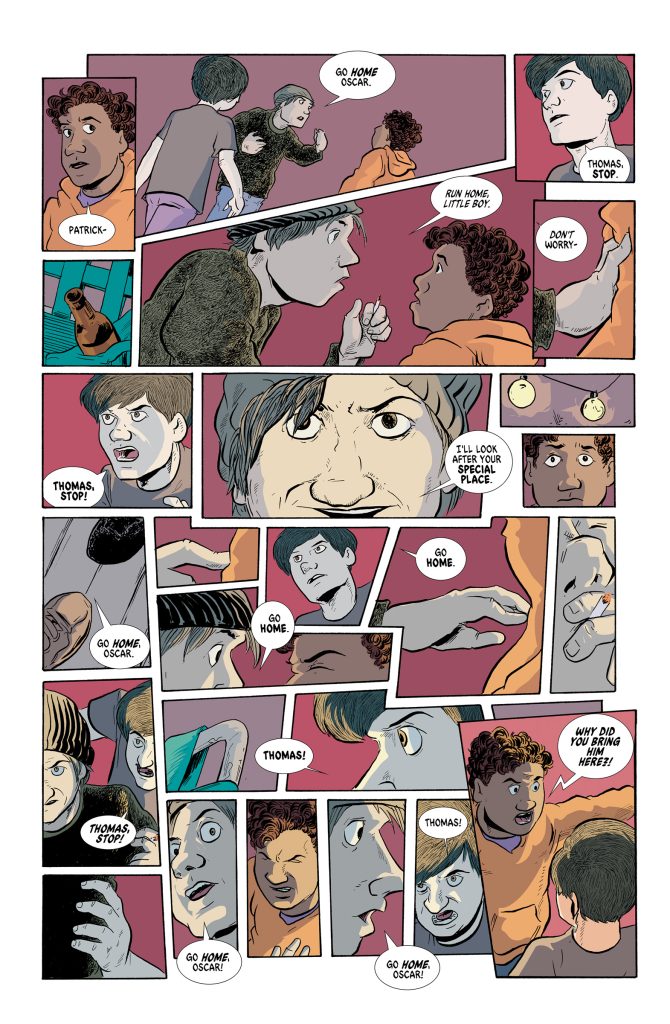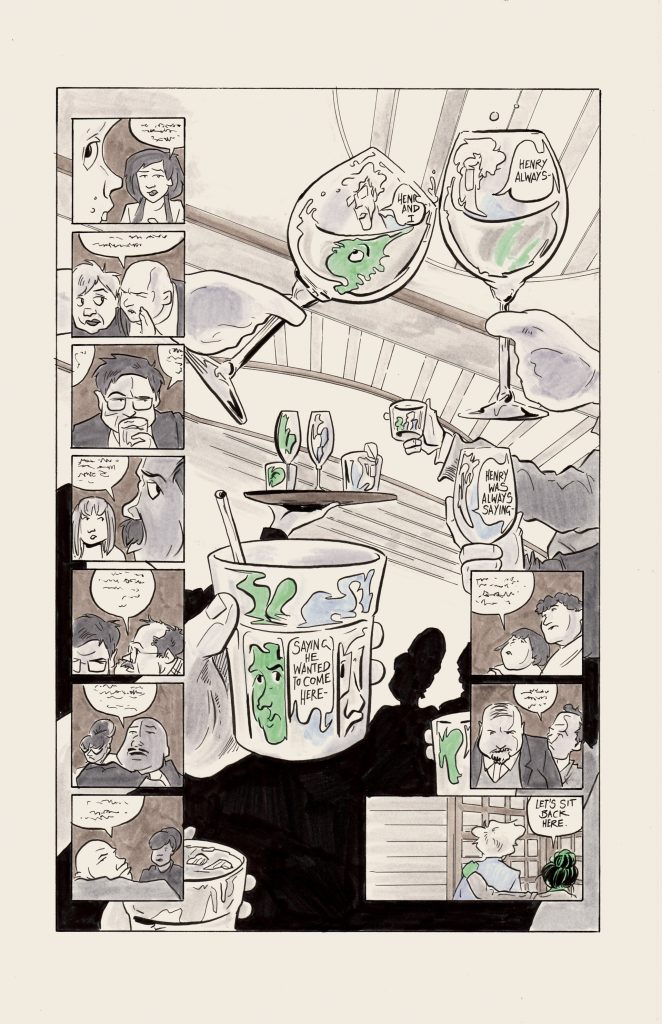cold night
the stubbornness
of peanut butter
Merriam-Webster's Word of the Day for April 23, 2025 is:
slough • \SLUFF\ • verb
Slough is a formal verb used for the action of getting rid of something unwanted. It is usually used with off. Slough can also mean "to lose a dead layer of (skin)" or "to become shed or cast off."
// The editorial urges the mayor not to slough off responsibility for the errors in the report.
// The exfoliating cleanser promises to gently slough away dead skin cells.
Examples:
"Before she left her apartment, she gathered and washed some in a bowl. Then she drew a bath and soaked for a while, eating the figs one by one, swallowing even the hard stems. The steam and water loosened her tense muscles, and her aches started to vanish. She scrubbed herself until the dead skin sloughed off, and underneath, she was new." — Sally Wen Mao, Ninetails: Nine Tales, 2024
Did you know?
There are two verbs spelled slough in English, as well as two nouns, and both sets have different pronunciations. The first noun, referring to a swamp or a discouraged state of mind, is pronounced to rhyme with either blue or cow. Its related verb, which can mean "to plod through mud," has the same pronunciation. The second noun, pronounced to rhyme with cuff, refers to the shed skin of a snake (as well as anything else that has been cast off). Its related verb describes the action of shedding or eliminating something, just like a snake sheds its skin. This slough comes from Middle English slughe and is related to slūch, a Middle High German word meaning "snakeskin."

Notice from the SFWA Board of Directors:
Recently, the Science Fiction & Fantasy Writers Association (SFWA) was contacted in regards to contracts potentially being offered to writers submitting to a variety of magazines including Analog, Asimov’s Science Fiction, and F&SF, that contained some potentially problematic clauses. These magazines represent important and historic repositories of some of the best speculative fiction written in the past and the present.
After conversing with MustRead, Inc., the publisher of those magazines, SFWA is pleased to provide some additional clarification on the issues brought to our attention. To wit, contract clauses regarding performance or merchandising rights should not be included in agreements with the above magazines. If these clauses do appear, authors should negotiate to have them stricken or removed entirely from the agreement, as they are considered either an editorial error or a holdover from an outdated contract. While SFWA cannot and does not provide legal advice, we are suggesting that writers approach these specific agreements this way. SFWA appreciates the clarification from MustRead, Inc., on these clauses.
SFWA will continue to monitor agreements in the speculative fiction short story marketplace, and continue our work as advocates and defenders for our membership and the genre writing community at large. Our Contracts Committee provides model contracts for various types of written work and will also provide private review of contracts (with or without personally identifying information redacted).
Thank you for your attention to this matter. Remember to always read any contract you are being asked to sign with caution, and when possible, get proper legal advice before signing any agreement that you do not fully understand. And remember, contracts are always negotiable. Advocate for your work, and when you need our help, we are here.
On behalf of the SFWA Board of Directors,
Kate Ristau
President
The post Watch Those Contract Clauses! Clarification from MustRead, Inc. on Unusual Rights Inclusions appeared first on SFWA.
by Jessica Maison
A writer conjures images for their readers, whether writing prose, film, or comics. Comics writing has a set of best practices that share similarities and differences with screenwriting and prose writing. Most successful stories told in any medium must establish a dynamic world and protagonist while presenting an enticing inciting incident, climax, and resolution. They must create compelling characters with relatable strengths and weaknesses driven by interesting motivations. However, distinct differences exist between these mediums. Writing for comics is a visual medium, as is screenwriting, whereas prose is a language-based medium. Yet all three need to conjure images and dynamically travel through space and time. The way a writer in each medium achieves those feats is where the nuances in the writing techniques exist.
Similar to screenwriting, most of the words a comics writer puts into a script are meant for the writer’s collaborators. The comics writer is creating a world for their editor, penciler, inker, colorist, and letterer. Indirectly, the reader will see a visual interpretation of the writer’s words by that team as illustrated in panels. Directly, the reader will experience the writer’s words in the captions and word balloons, mostly as dialogue. Because comics is a visual medium, the less dialogue the better is a good rule. In a visual medium, the story should be told primarily through images. The writer must decide what images are shown and what ones are not, and there is great complexity in those choices, especially in comics, where such limited space exists to develop the story. If done well, the team of artists will build a compelling world and characters using the writer’s well-crafted blueprint.
Screenwriters use scenes to break up their story, choosing when to cut in and out of scenes and manipulating time to create the flow for their story. In film, each frame is projected on the same space. In comics, each panel (frame) occupies its own space. The writer determines what is shown in those panels, creating an illusion of motion or suspense. Even the page turn plays a significant role in the comic’s pacing. A comics writer must consider what action will be on a spread and what will turn the page. Comics rely on readers to fill in the blanks to make their series of images feel fluid and exciting. The comics writer must guide how the reader fills in those blanks by what they show in the panels and when they show it. A writer and artist create a kind of magic when determining the number of panels to use, what images to put in those panels, and how to place them on the page.

Page from Ambitious Failures, Richard Fairgray’s graphic memoir.
Alternately, prose writers use only words, relying on their readers’ imagination to transform those words into images. The prose writer can do this with as many words or as few as they desire. They usually spend more time describing the setting, characters, and actions because they do not have a camera or an illustrator to create those images. The prose writer must use the reader’s imagination as the conduit to create visuals.

Pages from Mary Shelley’s School for Monsters: The Killing Stone, written by Jessica Maison and illustrated by Anna Wieszczyk.
A fight scene demonstrates the differences in the three mediums very well. In prose, expressing the character’s internal struggle is just as important as describing the external action in a fight. In film, the writer focuses on what actions the director, designers, and actors need to focus on to advance character and plot. The screenwriter must reveal the character’s internal struggle with key moments in the action or pieces of dialogue to develop the story further. Both in film and prose, much of the action can be shown or described. For a comic writer, there is limited space and no actual motion. The writer can’t show the whole fight scene. They must plan out frames and create movement through the actions they choose to reveal.
 Page from the GLAAD Award-winning graphic novel Four Color Heroes by Richard Fairgray, published by Fanbase Press.
Page from the GLAAD Award-winning graphic novel Four Color Heroes by Richard Fairgray, published by Fanbase Press.
Additionally, a prose writer has more freedom to capture the abstract and invisible than a comics writer. They can take as much time as they want describing these things. In comics, a writer must show a character’s internal struggles using visual images and dialogue. Every emotion or motivation must be revealed in limited space and time. They can use thought balloons but sparingly. It is stronger to convey a character’s thoughts through action. That rule is valid in all mediums but is most crucial in comics.
The way the reader experiences time is different in comics than in novels and in films. A reader processes a comic in many parts all at once. They can see what is happening on the next page, catch glimpses of several dialogue balloons ahead, and continue to see the panels they just read. They aren’t just reading in the present like a novel reader, but also in the near present and recent past. The writer needs to keep that in mind when planning out each page and then each panel. A reader takes in more images at once than it does sentences, and that truth differentiates the approach for a comics writer from a prose writer and even a screenwriter. The way the comics reader experiences space and time is a constraint that, when utilized properly, advances a story in a way that can’t be accomplished in other mediums.
 Page from The Ex-Wives of Frankenstein, written and drawn by Richard Fairgray.
Page from The Ex-Wives of Frankenstein, written and drawn by Richard Fairgray.
Constraints of each medium are also tools. Comics writers must make their medium’s constraints work for them, just like a screenwriter or novelist. Unlike prose, budget and page count constraints play a significant role in comics and screenwriting. If the budget is small, a comics writer will have to develop more story with less art, and a screenwriter will have to replace higher budget scenes with more contained ones. The prose writer typically doesn’t have to make more with less.
Conjuring images and manipulating space and time is at the core of writing, and the techniques a writer utilizes for a medium are determined by that medium’s relationship to images, space, and time. Keeping those relationships in mind when switching from writing one medium to another will set a writer up for a successful transition.

Jessica Maison is a sci-fi, fantasy, and horror author, screenwriter, and comic creator. Plastic Girl is her coming-of-age ecopunk YA novel series set in a climate apocalypse. She is the writer of the award-winning graphic novel series Mary Shelley’s School for Monsters, and her short comics have been featured in anthologies such as Cthulhu is Hard to Spell and Nightmare Theater. She is an IBPA Benjamin Franklin Gold Award winner and Foreword INDIES Award nominee. Her sci-fi speculative short stories have been published by Terraform, and she is the founder of Wicked Tree Press.
The post Conjuring Images when Writing for Comics, Prose, and the Screen appeared first on SFWA.
Merriam-Webster's Word of the Day for April 22, 2025 is:
liaison • \lee-AY-zahn\ • noun
Liaison refers to a person who helps organizations or groups work together and provide information to each other, or to a relationship that allows such interactions. Liaison can also refer to an illicit sexual relationship.
// The new position involves acting as a liaison between the police department and city schools.
// The committee has maintained close liaison with some of the former board members.
Examples:
“In 2019, [Jefri] Lindo found work at Bestia, the trendy downtown restaurant. ... He flourished there, working his way up to house expeditor, acting as the key liaison between the kitchen and dining room.” — Laura Tejeda, The Los Angeles Times, 27 Feb. 2025
Did you know?
If you took French in school, you might remember that liaison is the word for the phenomenon that causes a silent consonant at the end of one word to sound like it begins the next word when that word begins with a vowel, so that a phrase like beaux arts sounds like \boh zahr\. We can thank French for the origin of the term liaison, as well. It comes from Middle French lier, meaning “to bind or tie.” Other English senses of liaison apply it to all kinds of bonds—from binding and thickening agents used in cooking (as in “a butter and flour liaison”), to people who work to connect different groups, to the kind of secret relationship sometimes entered into by two people who are romantically attracted to one another.
Organization Overview
The Science Fiction and Fantasy Writers Association (SFWA) is a 501(c)(3) non-profit charitable organization for published writers and industry professionals in the field of science fiction, fantasy, and related genres. Founded in 1965, SFWA runs the annual Nebula Conference, the Nebula Awards, and has a number of programs to assist authors worldwide.
Compensation: $77,000 – 80,000/year with benefits.
Status: This is a full time, salaried position. Candidates must be US-based and eligible for legal employment.
Location: Hybrid remote/on-site (annual conference location)
Position Overview
The Operations Director is one of the key management leaders for SFWA. The Operations Director is responsible for overseeing operations (including membership and systems management), accounting and office administration, and internal fundraising and development processes (auction, sponsorship processes, and fundraising systems). The Operations Director will report directly to the President of the Board of Directors and lead a fully remote team of employees, contractors, and volunteers.
Key Job Responsibilities
Financial Management: Ensure the financial health of the organization while maintaining fiscally responsible spending.
- Oversee the creation of the annual budget.
- Monitor financial performance to ensure organizational stability.
- Ensure accurate and timely financial statements and filings.
- Lead and support the development and implementation of fundraising systems.
- Develop and maintain financial policies to ensure financial transparency and responsibility.
- Develop annual goals and action plans in alignment with SFWA’s strategic plan.
Operational Leadership: Actively manage day-to-day operations and ensure compliance.
- Ensure that the internal operations of the organization run smoothly.
- Cultivate and manage strategic operational partnerships.
- Directly manage and build volunteer teams supporting operations efforts.
- Support Advisory Committees in conjunction with board liaisons.
- Lead timely implementation of board initiatives in operations.
Human Resources: Supervise Human Resources.
- Establish and maintain human resources policies and procedures.
- Manage contractors, vendors, and associated contracts and agreements.
- Oversee payroll and manage employee benefits systems.
- Actively engage with board, staff, and stakeholders to ensure open lines of communication.
Technology and Systems: Manage operational systems and technology integrations.
- Lead database management and improvements in membership, financial, and development systems and processes.
- Support communication systems management in partnership with the Communications and Marketing Manager.
Staff and volunteer relations: Along with the executive director, serve as a key liaison between the staff, volunteers, and the board of directors.
- Schedule and support weekly all-staff and President meetings.
- Ensure effective and supportive communication across all levels of the organization, in partnership with the Communications and Marketing Manager.
Skills and Qualifications
- Bachelor’s degree required. Advanced degree preferred in nonprofit management, education, or a field related to publishing.
- Minimum 5 years in senior management of a nonprofit organization or in a related field.
- Significant experience managing volunteers and/or staff required.
- Experience in fundraising and donor cultivation. Expectation of familiarity with Customer Relation Management systems and databases.
- Strong financial management and budgeting background, including in-depth understanding of financial reporting.
- Strong management skills focused on creating and supporting a collaborative and cooperative team environment.
- Dedicated commitment to advocacy for the arts in general and science fiction and fantasy in particular.
- Proficiency leveraging technology for remote work and project management.
- Ability to work remotely and collaboratively with a worldwide team.
- The ability to travel to the annual Nebula Award Conference.
Deadline for Applications
May 2, 2025.
How to Apply
SFWA is a 501(c)3 non-profit organization and an equal opportunity employer. We do not discriminate on the basis of race, gender identity, religion, color, sexual orientation, sex, marital/family status, national origin, age, physical ability, or income. We strongly encourage applicants within traditionally underrepresented and marginalized communities.
Email a cover letter and resume in a single file (MS Word or PDF files only) to jobs <at> sfwa <dot> org. Please include “Operations Director’ in the subject line.
Please note all job applications will be reviewed by members of staff and the board at SFWA. No AI will be used in assessment of applicants. Additionally, the selected candidate will be required not to engage generative AI in the performance of their duties.
Thank you for your interest in working for SFWA!
The post Now Hiring! Operations Director of SFWA appeared first on SFWA.
Merriam-Webster's Word of the Day for April 21, 2025 is:
bodacious • \boh-DAY-shuss\ • adjective
Bodacious is used as an informal synonym of remarkable and noteworthy, as well as sexy and voluptuous. In some dialects of the Southern and Midland US, bodacious is used by its oldest meaning: "outright, unmistakable."
// The bodacious decor of the boutique hotel is intended to appeal to the young and the hip.
Examples:
"There’s no need to lug in a 6-foot specimen tree to add bodacious botanicals into your home, because even the smallest planters can make a big impact when intentionally pairing striking foliage with a unique vessel." — Kristin Guy, Sunset Magazine, 5 Mar. 2024
Did you know?
Some of our readers may know bodacious as a word that figured prominently in the lingo of the 1989 film Bill and Ted's Excellent Adventure. Others may recall the term's frequent use in the long-running "Snuffy Smith" comic strip. Neither the creators of the comic strip nor the movie can claim to have coined bodacious, which began appearing in print in the mid-1800s, but both surely contributed to its popularity. The exact origin of the word is uncertain, but it is most likely a blend of bold and audacious, and it may be linked to boldacious, a now-rare British dialect term meaning "brazen" or "impudent."
Merriam-Webster's Word of the Day for April 20, 2025 is:
resurrection • \rez-uh-REK-shun\ • noun
In Christian theology, Resurrection (typically capitalized in this use) refers to the event in which Jesus Christ returned to life after his death. In general contexts, resurrection refers to the act of causing something that had ended or been forgotten or lost to exist again, to be used again, etc.
// Church members look forward to celebrating the Resurrection every Easter.
// The community applauded the resurrection of the commuter rail system.
Examples:
“Some of their efforts to follow Scripture were wonderfully zany. To wrest the death and resurrection of Jesus away from both pagan fertility rituals and Hallmark, they outlawed Easter egg hunts. ... She smashed chocolate Easter bunnies with a meat tenderizer and ripped the heads off marshmallow Peeps, while the boys gleefully gobbled the ruined remnants of consumer culture.” — Eliza Griswold, Circle of Hope: A Reckoning with Love, Power, and Justice in an American Church, 2024
Did you know?
The word resurrection first arose in English in the 14th century, coming from the Anglo-French word resurreccioun, which in turn comes from the Late Latin verb resurgere, meaning “to rise from the dead.” Originally, the word was used in Christian contexts to refer to the rising of Christ from the dead or to the festival celebrating this rising (now known as Easter). Perhaps showing the influence of the Late Latin verb resurgere’s Latin forerunner, which could mean “to rise again” (as from a recumbent position) as well as “to spring up again after being cut” (used of plants), resurrection soon began to be used more generally in the senses of “resurgence” or “revival.” It even forms part of the name of the resurrection fern, an iconic fern of the southern United States often seen growing on the limbs of live oak trees. The fern is so named due to the fact that in dry weather it curls up, turns brown, and appears dead, only to be “brought back to life” when exposed to moisture.
Merriam-Webster's Word of the Day for April 19, 2025 is:
fastidious • \fass-TID-ee-us\ • adjective
Someone described as fastidious is extremely or overly careful about how they do something. Fastidious may also describe someone who is difficult to please, or someone who always wants to be clean, neat, etc.
// Our parents taught us to be fastidious in keeping our rooms clean, making sure to dust every surface and sweep out every corner.
// He's a fastidious dresser whose fashion choices seem to anticipate the newest trends.
Examples:
"Becoming Led Zeppelin, filmmaker Bernard MacMahon's new documentary about the band, certainly succeeds at taking Led Zeppelin seriously, in ways that might disappoint some viewers but that I found both compelling and refreshing. Becoming Led Zeppelin doesn't hide that it's an authorized biopic … but the film is so fastidious and detail-oriented that it never feels like hagiography." — Jack Hamilton, Slate, 11 Feb. 2025
Did you know?
If you presume that the adjective fastidious bears some relation to fast, not so fast. Fastidious comes from Latin fastidium, meaning "aversion" or "disgust." Fastidium is believed to be a combination of fastus, meaning "arrogance," and taedium, "irksomeness" or "disgust." (Taedium is also the source of tedium and tedious.) In keeping with its Latin roots, fastidious once meant "haughty," "disgusting," and "disagreeable," but the word is now most often applied to people who are very meticulous or overly difficult to please, or to work which reflects a demanding or precise attitude. Our own fastidiousness requires us to point out that the familiar adjective fast comes not from Latin, but from Old English.
Merriam-Webster's Word of the Day for April 18, 2025 is:
collaborate • \kuh-LAB-uh-rayt\ • verb
To collaborate is to work with another person or group in order to do or achieve something. Collaborate can also be used disapprovingly to mean "to cooperate with or willingly assist an enemy of one's country and especially an enemy who occupies it during a war."
// Several research teams from various countries collaborated closely on the project.
// They were suspected of collaborating with enemy forces.
Examples:
"Forever 21 collaborated with photographer Henry R. Jones II for the reveal of its Black History Month unisex collection. The 17-piece display delivers deeply personal pieces intimately connected to Jones' artistic journey. Known for his striking photography and poetry, Jones extends a unique invitation to the viewer, allowing them to immerse themselves in the intricate layers of his art." — Kenyatta Victoria, Essence, 1 May 2024
Did you know?
The Latin prefix com-, meaning "with, together, or jointly," is a bit of a chameleon—it has a habit of changing its appearance depending on what it's next to. For example, if the word it precedes begins with l, com- becomes col-. In the case of collaborate, com- teamed up with the verb laborare ("to labor") to form the Late Latin word collaborare ("to labor together"). Be careful not to confuse collaborate with corroborate, another com- relative. This word was formed when com- (this time shape-shifting to cor-) joined forces with the Latin word robur ("strength"). Together, by way of the Latin verb corroborare, they created the meaning "to support or help prove (a statement, theory, etc.) by providing information or evidence," which carried over into the English word corroborate.
Merriam-Webster's Word of the Day for April 17, 2025 is:
uncouth • \un-KOOTH\ • adjective
Uncouth describes things, such as language or behavior, that are impolite or socially unacceptable. A person may also be described as uncouth if they are behaving in a rude way.
// Stacy realized it would be uncouth to show up to the party without a gift, so she picked up a bottle of wine on the way.
Examples:
“Perhaps people deride those who buy books solely for how they look because it reminds them that despite their primary love of literature, they still appreciate a beautiful cover. It’s not of primary importance but liking how something looks in your home matters to some extent, even if it feels uncouth to acknowledge.” — Chiara Dello Joio, LitHub.com, 24 Jan. 2023
Did you know?
Old English speakers used the word cūth to describe things that were familiar to them, and uncūth for the strange and mysterious. These words passed through Middle English into modern English with different spellings but the same meanings. While couth eventually dropped out of use, uncouth soldiered on. In Captain Singleton by English novelist Daniel Defoe, for example, the author refers to “a strange noise more uncouth than any they had ever heard,” while Shakespeare wrote of an “uncouth forest” in As You Like It. This “unfamiliar” sense of uncouth, however, joined couth in becoming, well, unfamiliar to most English users, giving way to the now-common meanings, “rude” and “lacking polish or grace.” The adjective couth in use today, meaning “sophisticated” or “polished,” arose at the turn of the 20th century, not from the earlier couth, but as a back-formation of uncouth, joining the ranks of other “uncommon opposites” such as kempt and gruntled.




